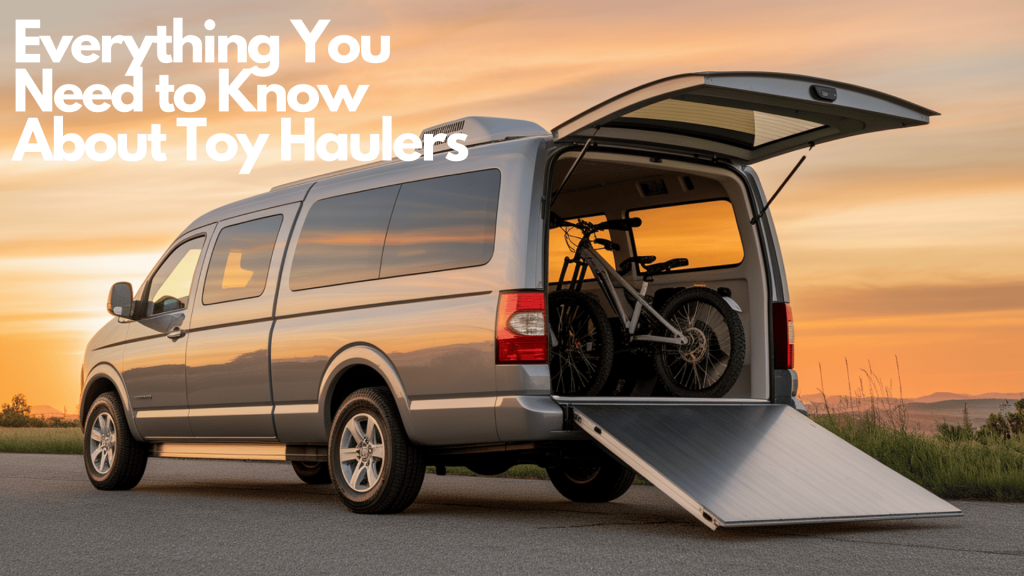Ever dreamed of hauling your dirt bike to Moab, your ATV to the dunes, or your kayaks to that hidden lake—without sacrificing a good night’s sleep?
Enter the toy hauler: the Swiss Army knife of the RV world! These versatile rigs offer the perfect blend of “garage on wheels” and cozy living quarters, letting you bring your outdoor toys along for the adventure without roughing it at night.
So, are you a weekend warrior or a full-time nomad? Toy haulers are transforming how adventure-seekers experience the great outdoors. Buckle up as we explore everything you need to know about these game-changing recreational vehicles!
What is a Toy Hauler?
A toy hauler is a specialized recreational vehicle with a built-in garage area at the rear. It is designed specifically to transport outdoor recreational equipment—or “toys”—such as ATVs, dirt bikes, motorcycles, kayaks, and bicycles.
The layout typically includes standard living quarters in the front portion, complete with a kitchen, bathroom, sleeping areas, and entertainment spaces. What distinguishes toy haulers from conventional RVs is the dedicated cargo space at the rear.
Visually, toy haulers often resemble traditional travel trailers or fifth wheels, but with a notable difference: the substantial ramp door at the back. The garage area can typically accommodate vehicles measuring up to 10-12 feet in length, depending on the model.
Types of Toy Haulers
1. Travel Trailer Toy Haulers
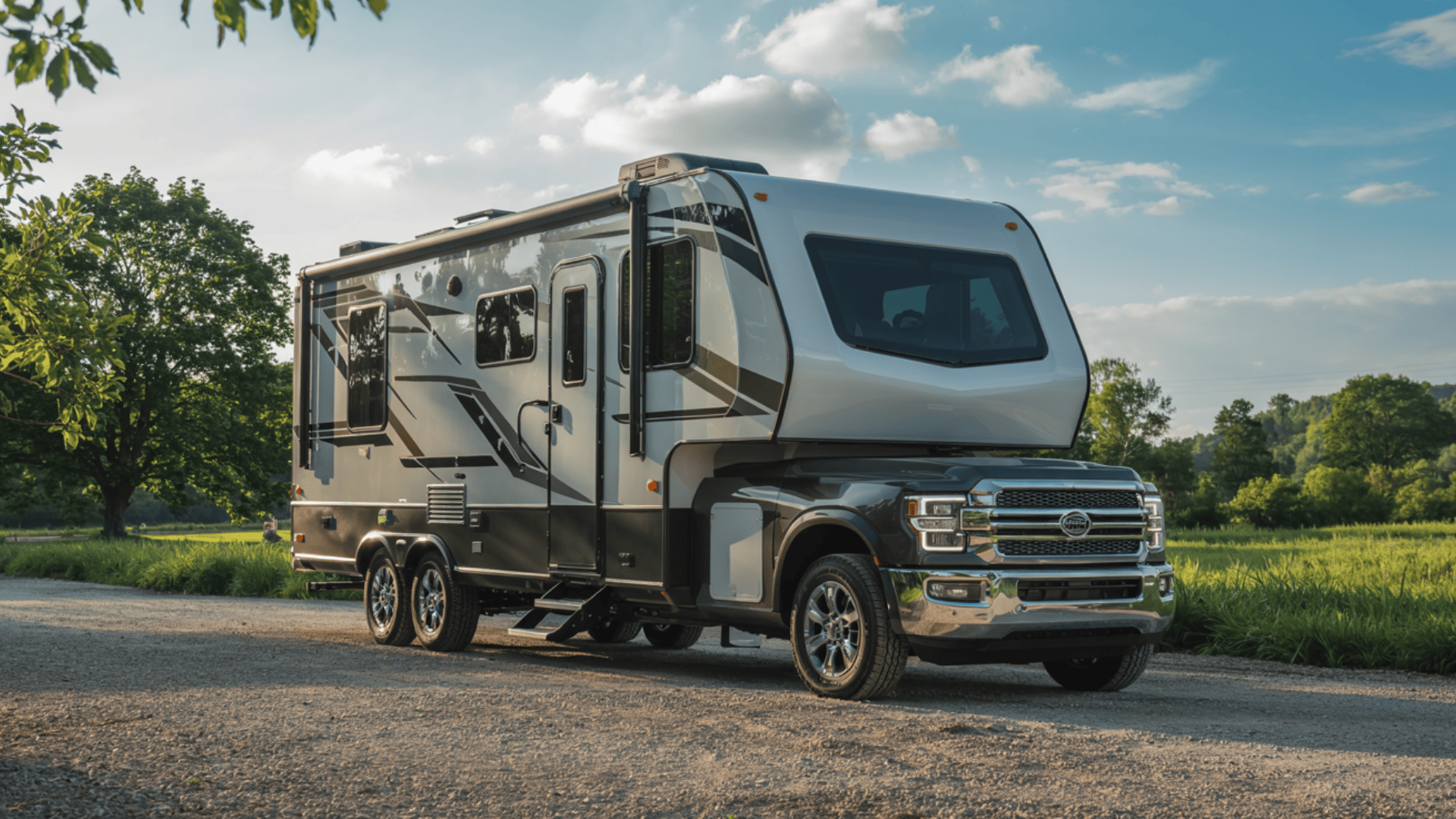
Travel trailer toy haulers represent the most accessible entry point into the toy hauler market. These units connect to your vehicle via a standard bumper hitch, eliminating the need for specialized towing equipment.
Their lighter weight profile makes them suitable for a wider range of towing vehicles, often allowing half-ton trucks and even some properly equipped SUVs to serve as capable towers. These units generally range from 18 to 35 feet in length.
2. Fifth Wheel Toy Haulers
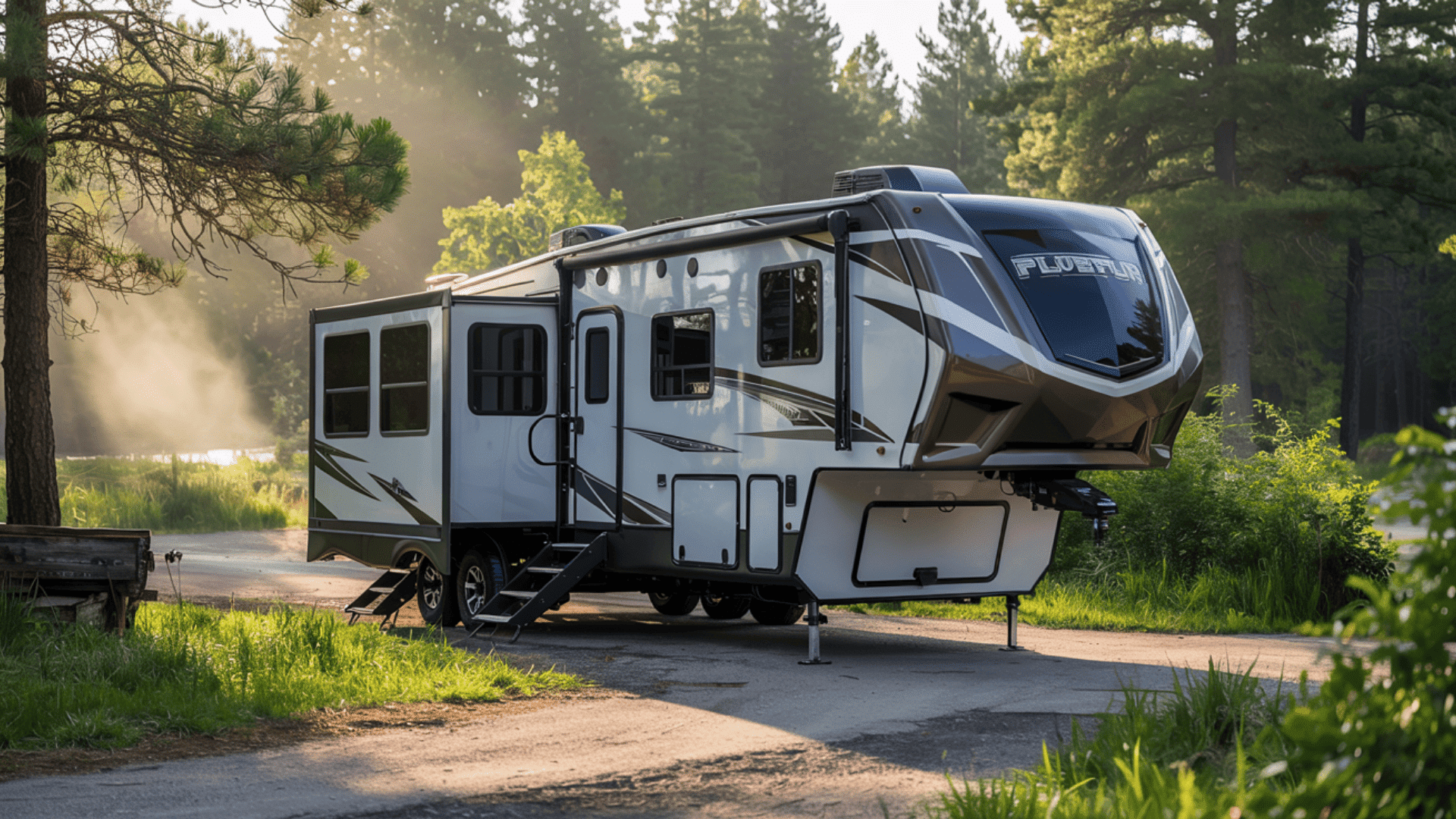
Fifth-wheel toy haulers connect to a specialized hitch installed in a pickup truck’s bed, creating a more stable towing experience even in challenging conditions.
This design allows manufacturers to create a bi-level floor plan, often positioning the master bedroom above the truck bed and maximizing interior living space. The improved stability makes fifth wheels the preferred choice for those planning extensive travel or full-time living.
3. Class A Toy Hauler Motorhomes
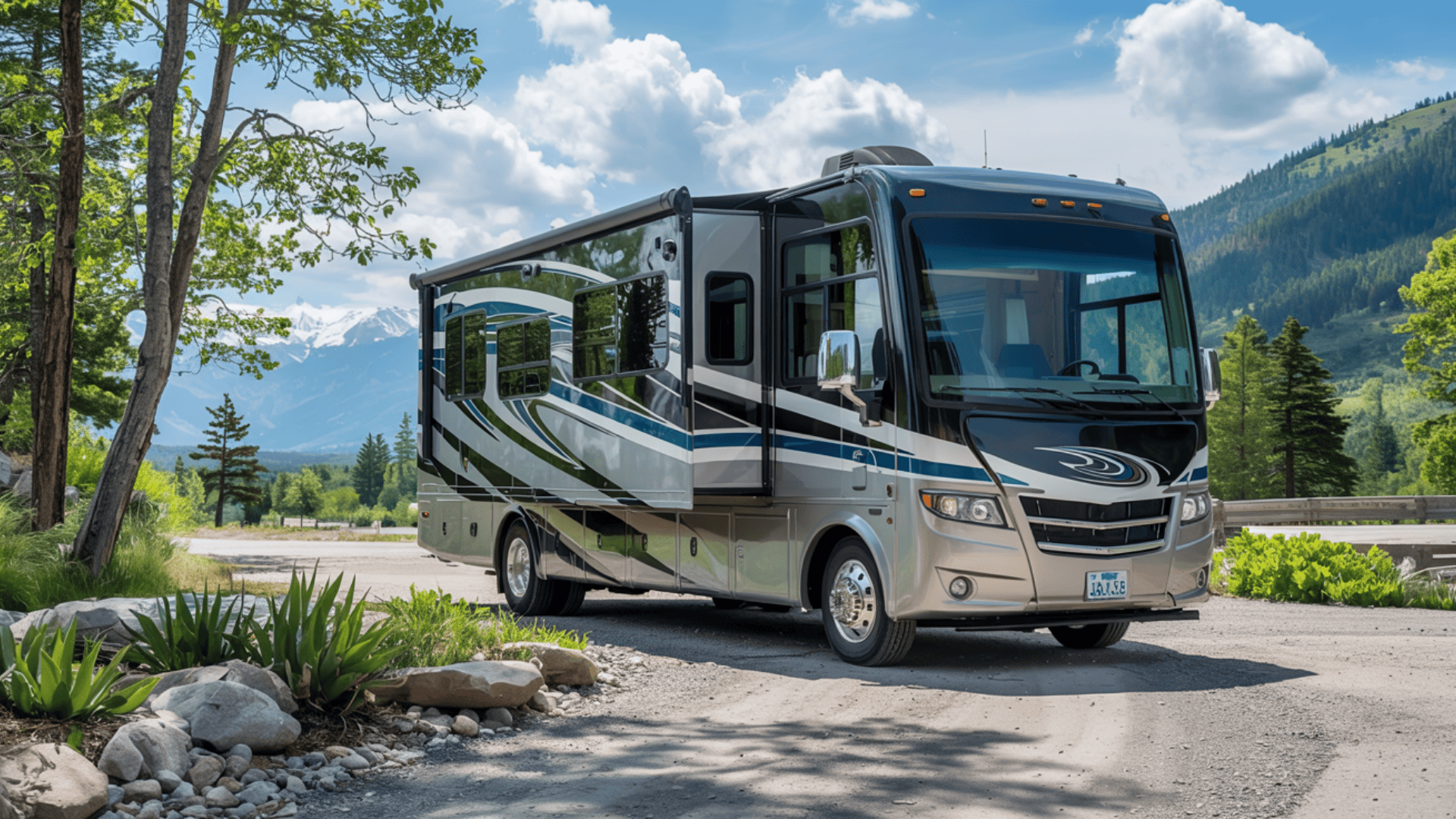
Class A toy hauler motorhomes represent the premium segment of the market, built on heavy-duty chassis with powerful diesel engines.
These integrated units eliminate the need for a separate towing vehicle, combining driving cab, living quarters, and garage space in a single vehicle. The luxury appointments typically include residential-style amenities, superior insulation, high-end finishes, and comprehensive electronics packages.
4. Class C Toy Haulers
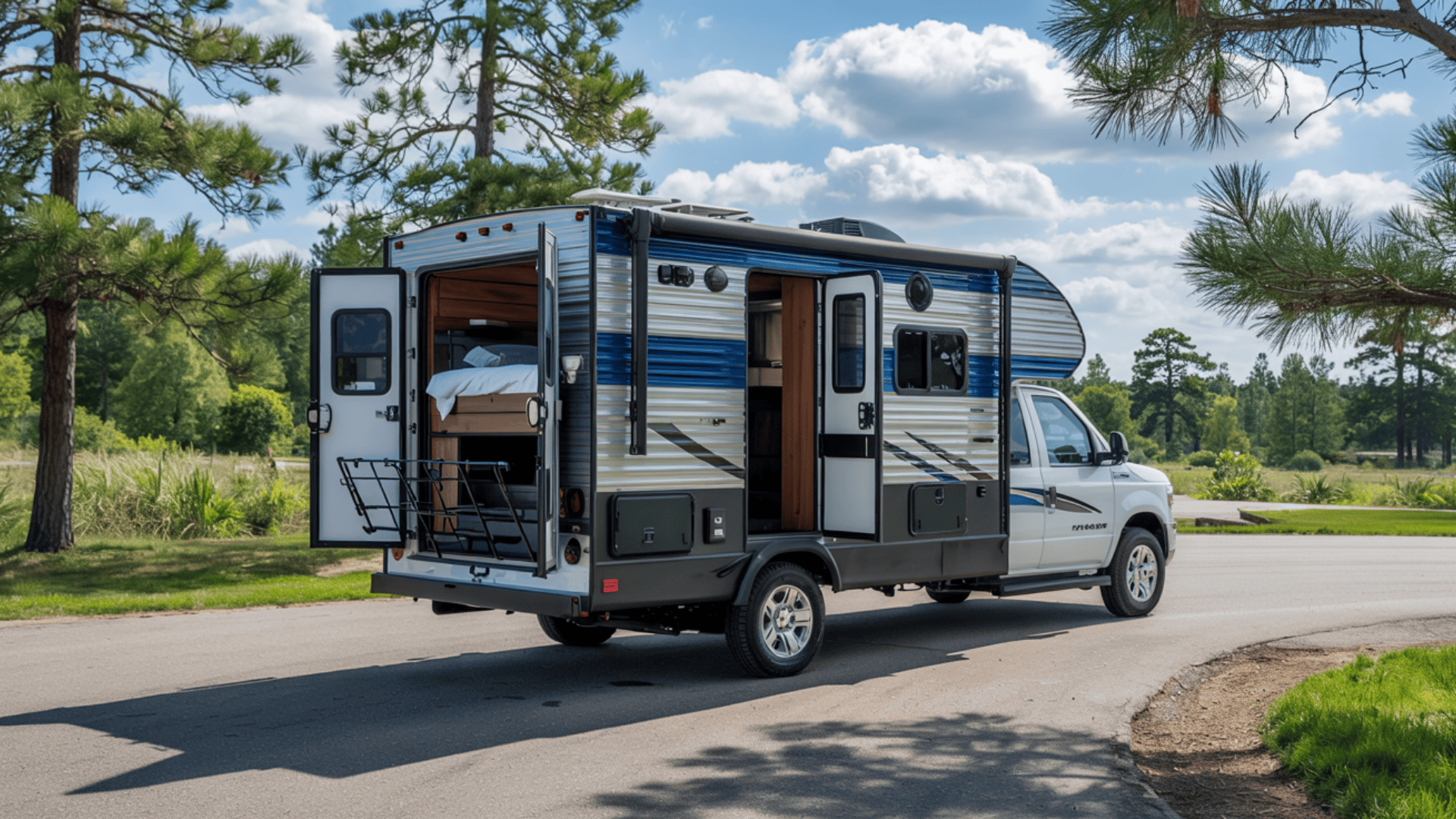
Class C toy haulers offer a compromise between the drivability of a smaller vehicle and the convenience of an integrated motorhome. Built on van or truck chassis, these units feature the distinctive over-cab sleeping area that maximizes interior living space without increasing the overall footprint.
These units typically provide better fuel efficiency than Class A motorhomes while maintaining comfortable living amenities. The flexible design makes Class C toy haulers particularly well-suited for those who want the convenience of an all-in-one vehicle without the imposing size of larger motorhomes.
Key Features that Set Toy Haulers Apart
Rear Ramp Door
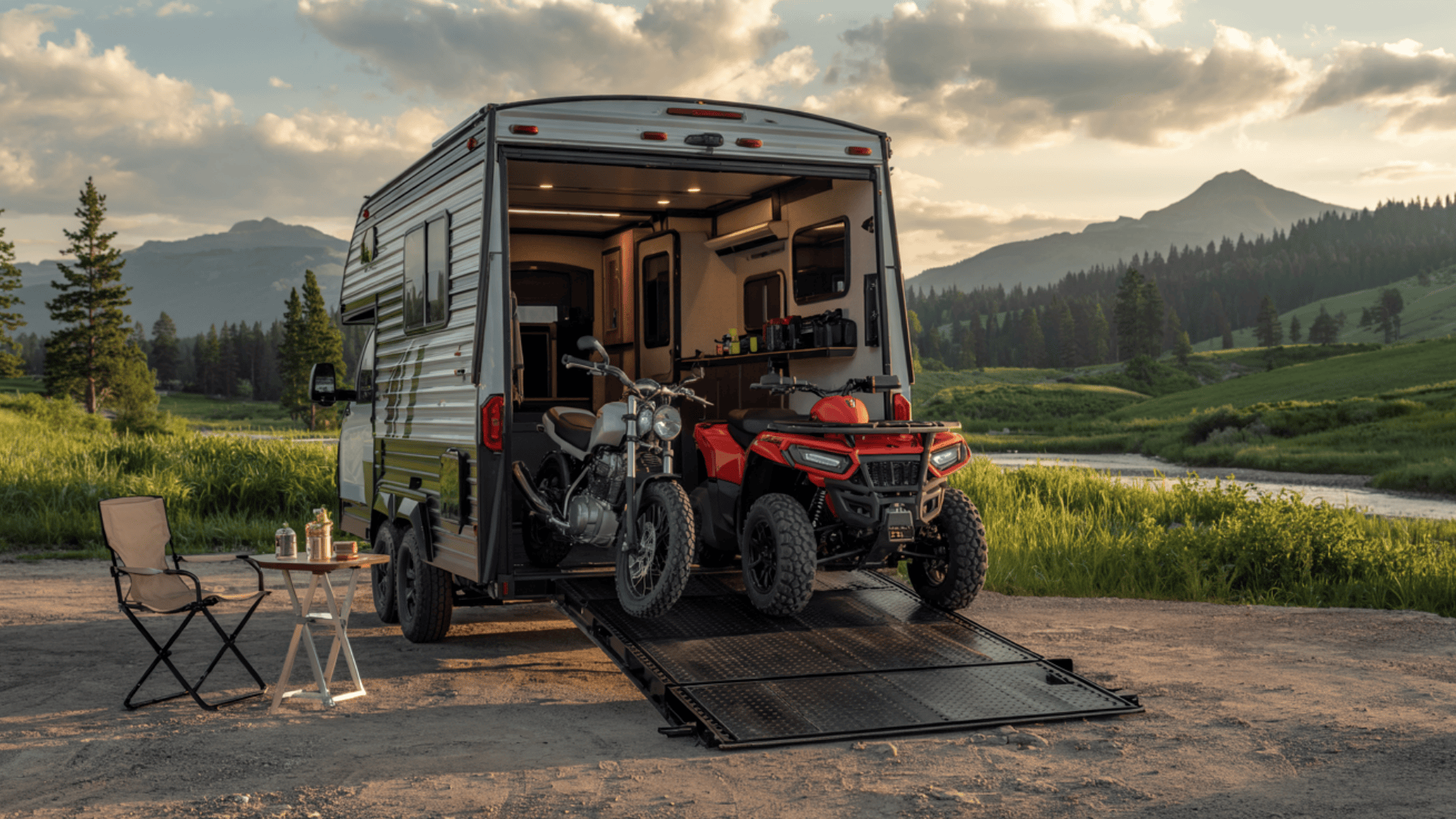
The signature feature of any toy hauler is its substantial rear ramp door. This engineering marvel serves multiple critical functions in the toy hauler design.
Primarily, it provides straightforward access for loading recreational vehicles and equipment into the garage space.
The ramp typically features heavy-duty construction with weight capacities ranging from 1,500 to 3,000 pounds, accommodating even the heaviest recreational vehicles.
Many modern toy haulers have transformed this utilitarian element into a multifunctional component by enabling it to convert into an elevated patio deck.
Garage Space with Specialized Accommodations
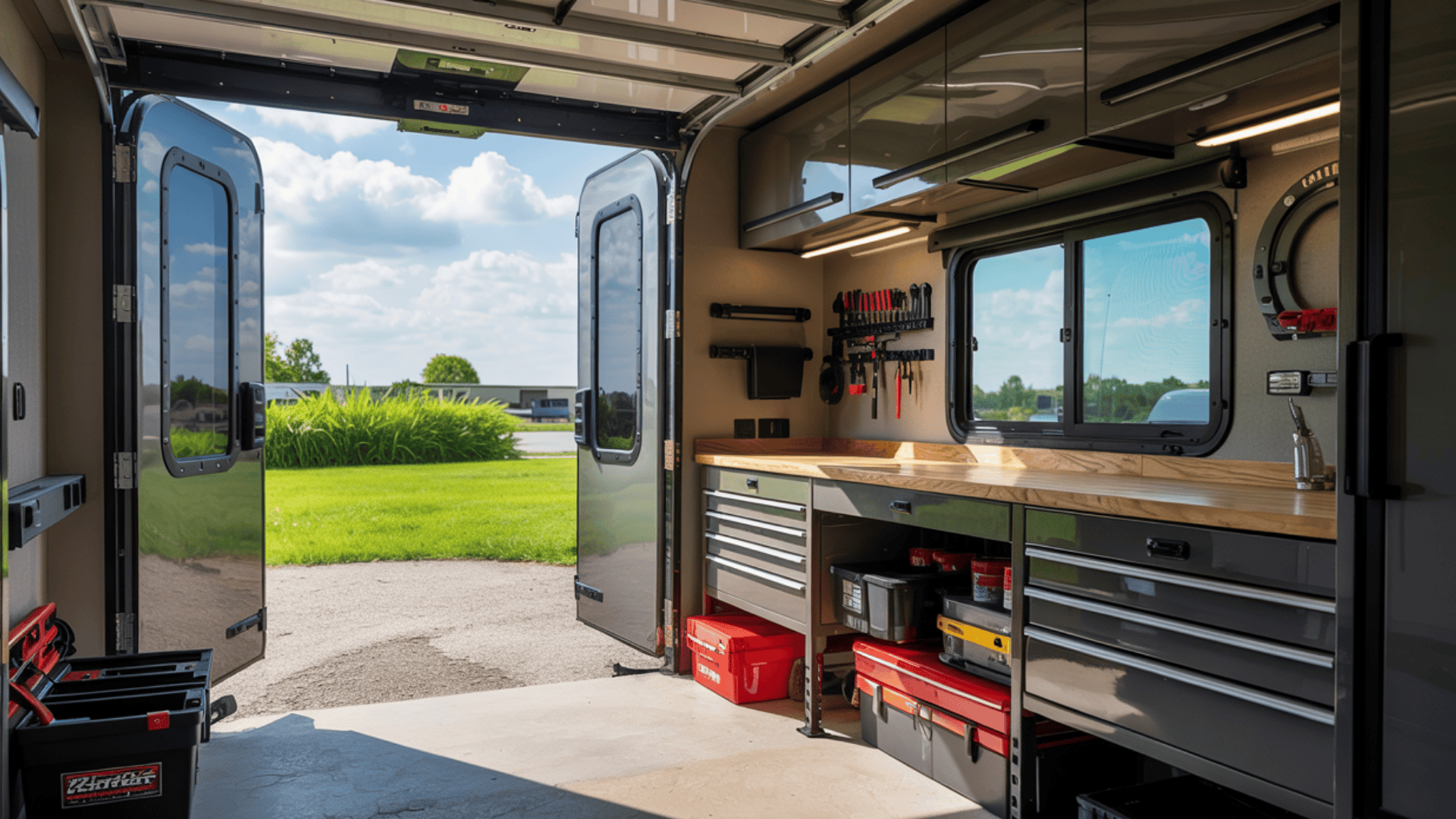
The garage area in toy haulers features purpose-built elements designed specifically for transporting recreational equipment.
Reinforced flooring with increased weight tolerance prevents damage during transit while accommodating the concentrated weight of wheeled vehicles.
Integrated tie-down points, strategically positioned throughout the garage floor, secure equipment during travel, preventing movement that could damage both the vehicles and the toy hauler interior.
Convertible Garage Functionality
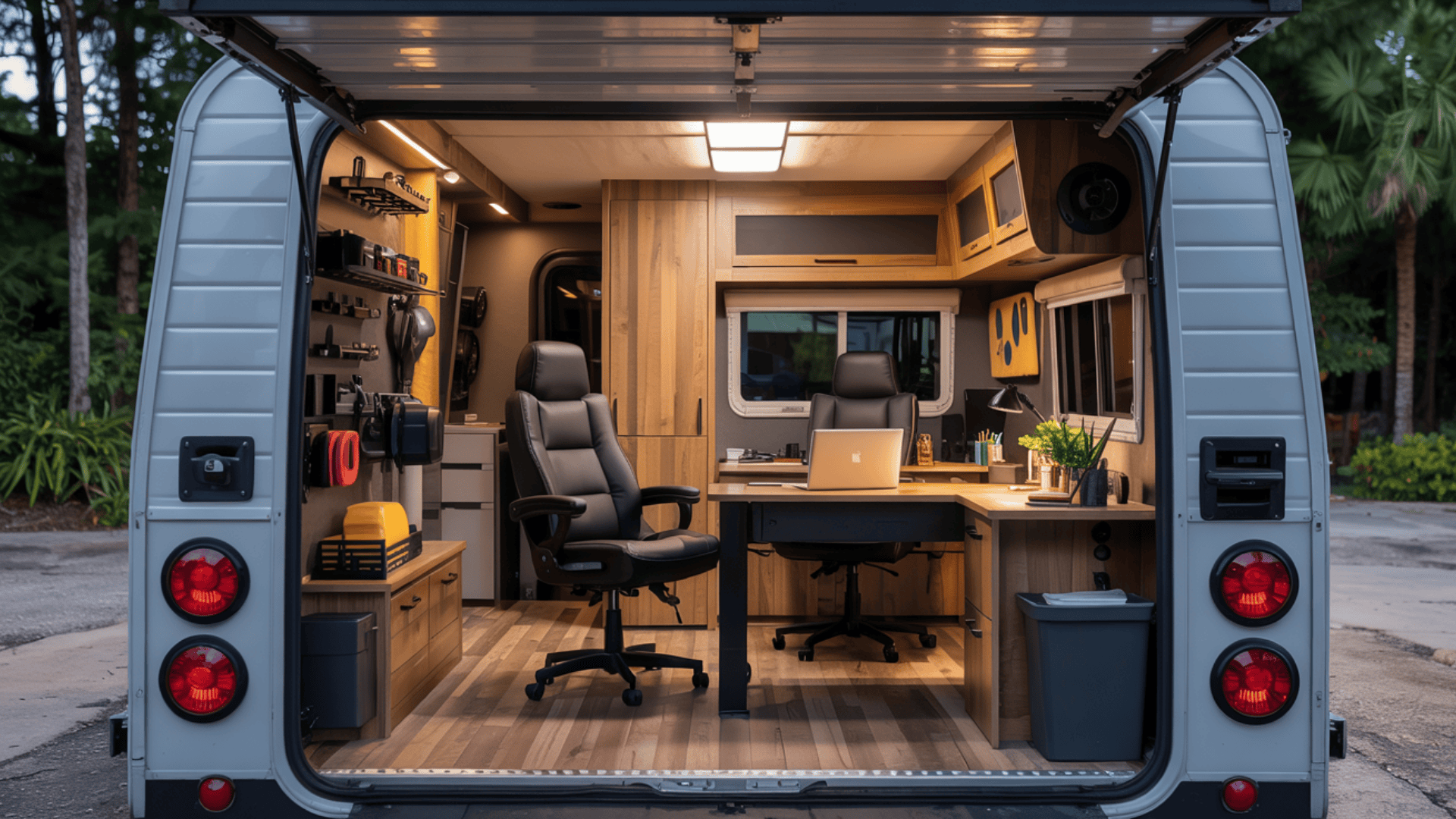
The versatility of modern toy haulers is perhaps best exemplified by the transformative nature of the garage space. When not transporting recreational vehicles, this area adapts to numerous alternative uses.
Power-lowering queen or king bed systems descend from the ceiling, instantly converting the area into additional sleeping quarters.
Fold-down sofas and dinettes create social spaces when vehicles are unloaded. Some owners repurpose the garage as home offices with dedicated workstations, taking advantage of the separation from the main living area.
Others install exercise equipment, creating mobile gyms that travel with them.
Power and Fuel Systems
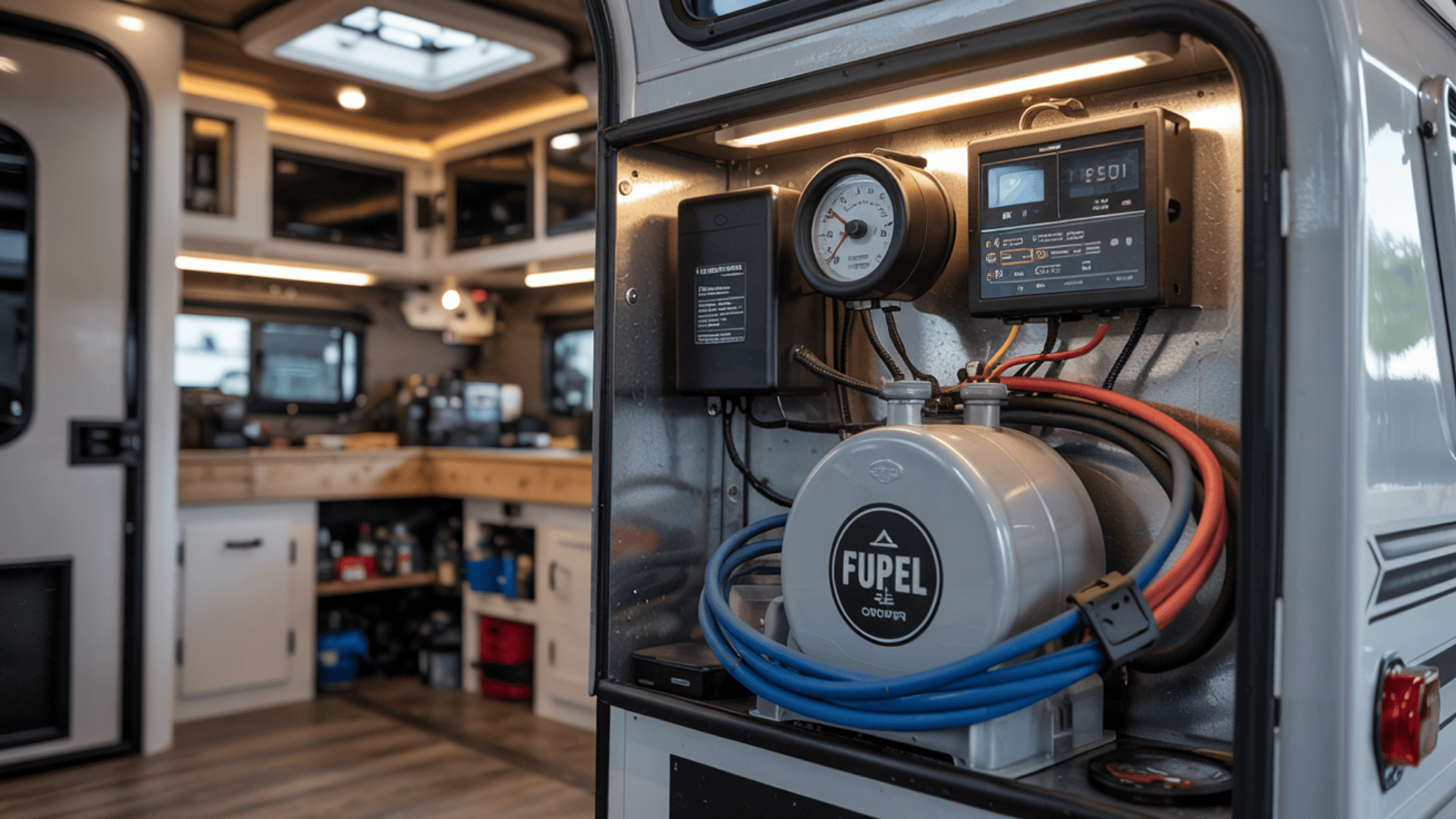
Optional fueling stations allow owners to transport gasoline for recreational vehicles safely, with external pumping systems that eliminate the need to carry separate gas cans.
Enhanced electrical systems, including upgraded generators and solar capabilities, address the increased power demands of these units.
Many models feature dedicated 240V circuits to accommodate specialized equipment or charging needs.
Separate climate control systems for the garage area maintain appropriate temperatures for equipment storage and human comfort when the space is used for other purposes.
Space Optimization Features
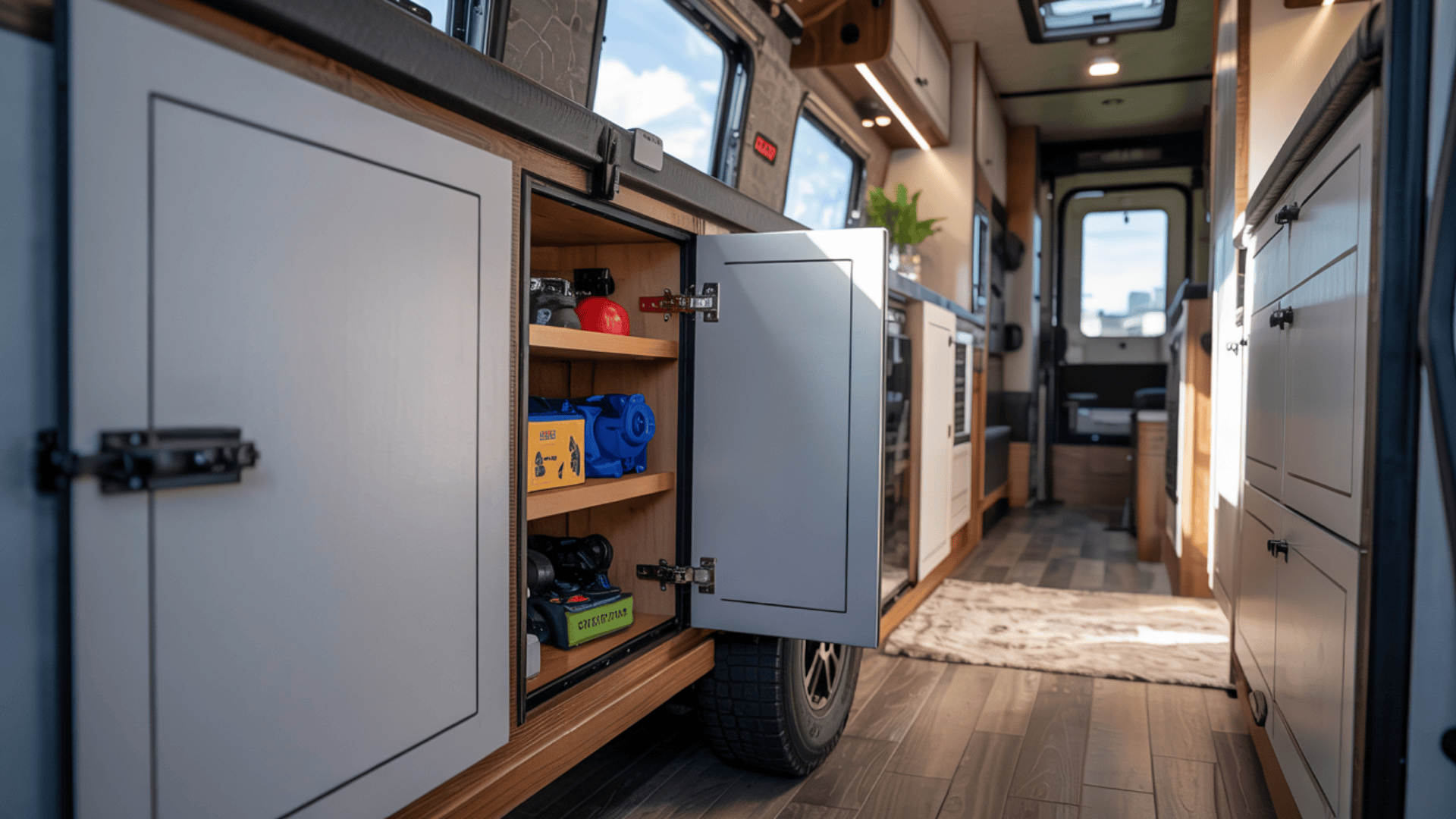
The dual-purpose nature of toy haulers has driven innovative approaches to space utilization. Furniture designed specifically for these units often incorporates multiple configurations, allowing for compact storage during transit and expanded deployment when parked.
Overhead storage systems maximize vertical space, keeping essential items accessible without consuming valuable floor area.
Specialized cabinetry with secure latching systems prevents movement during transit while providing organized storage for equipment and supplies.
Challenges and Considerations
1. Weight & Size
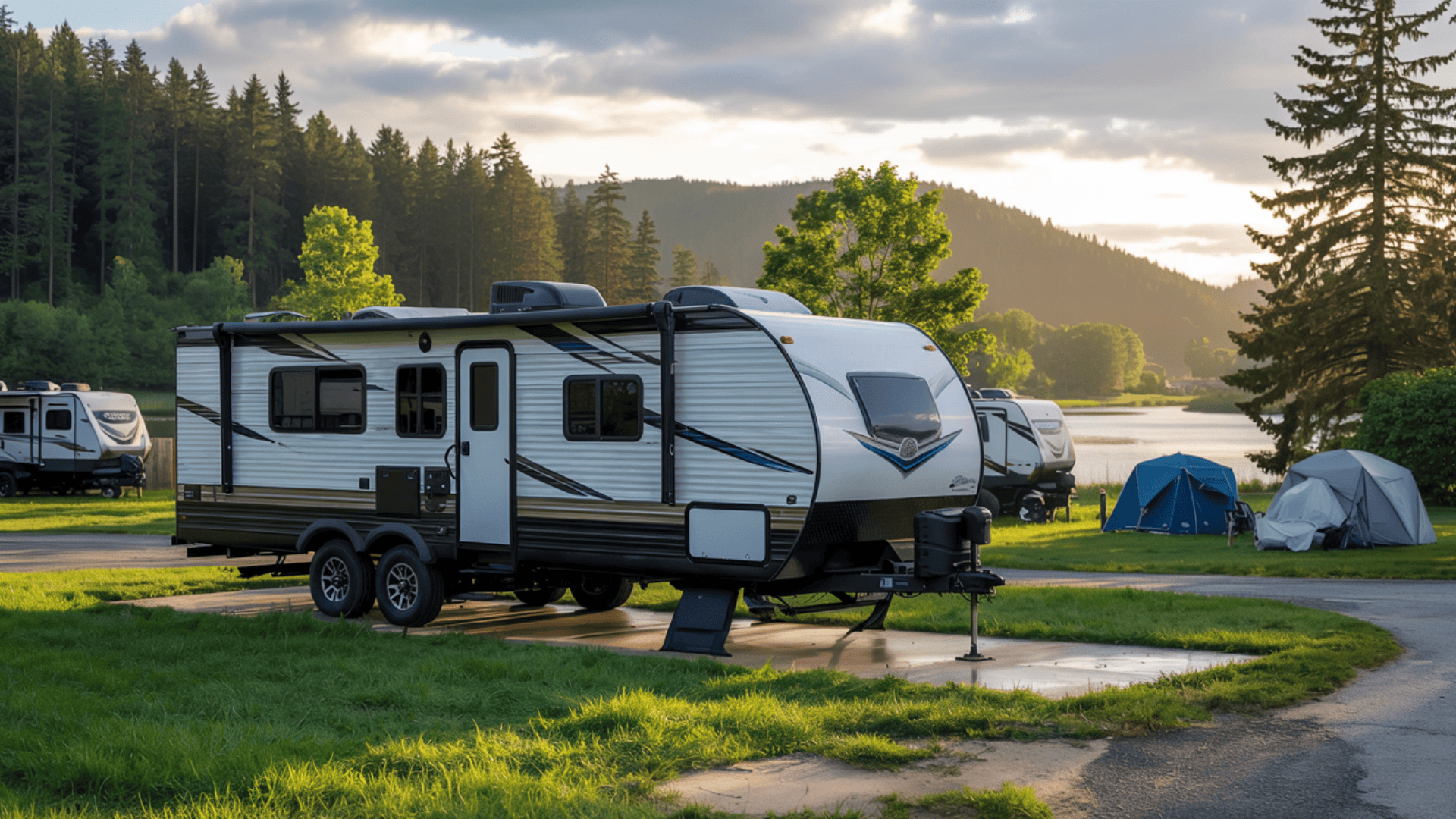
Most toy haulers weigh considerably more than comparable non-garage RVs due to reinforced framing, heavy-duty suspension systems, and the substantial weight of the ramp door mechanism.
The physical dimensions of toy haulers, particularly their length, limit campground compatibility, as many established campgrounds have size restrictions that exclude larger toy haulers.
The substantial weight also affects maneuverability on unpaved surfaces, potentially limiting access to remote boondocking locations or primitive camping areas that might otherwise be ideal for using the recreational equipment being transported.
2. Fuel Economy
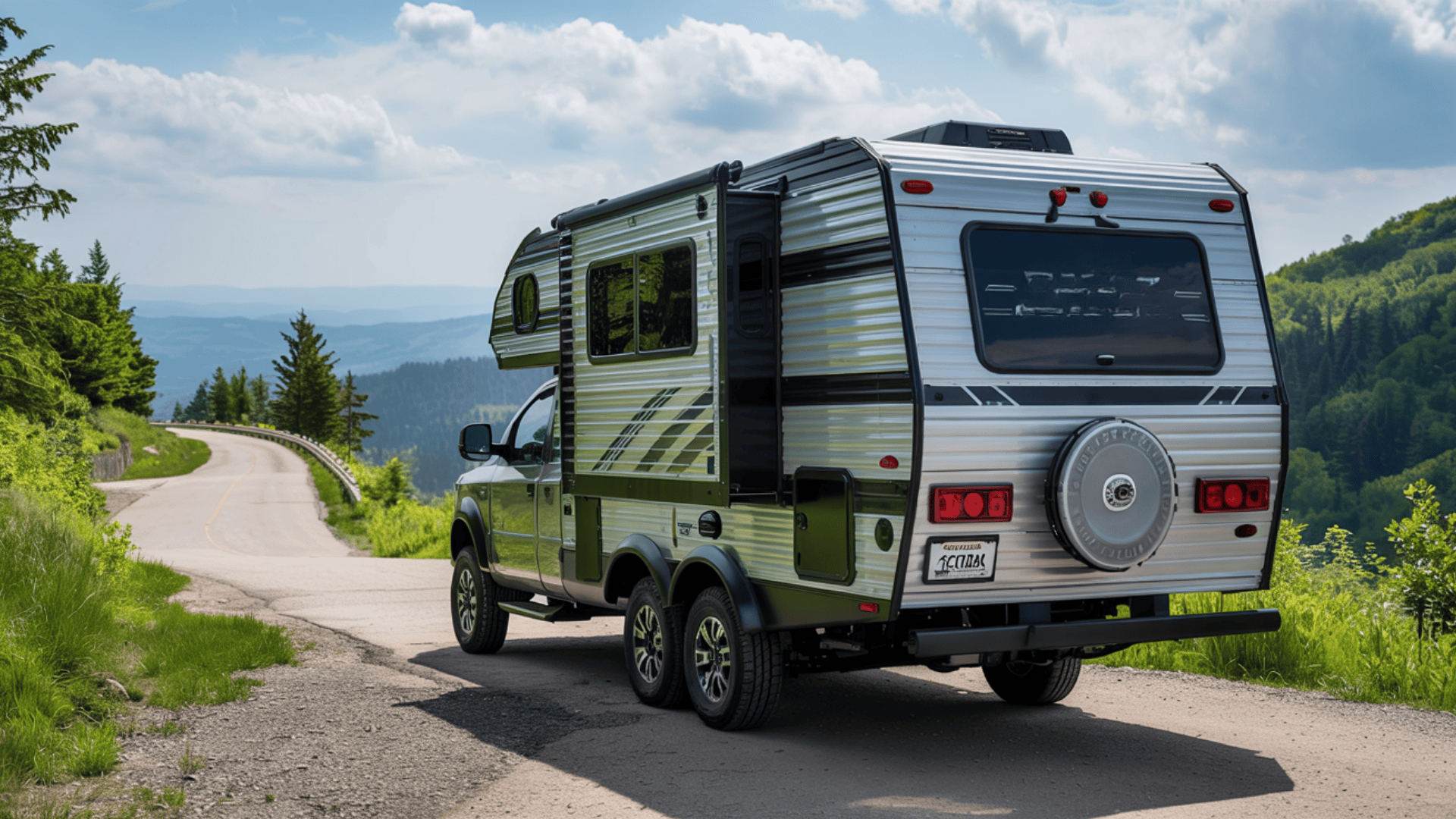
The weight implications of toy haulers extend directly to fuel consumption concerns for owners. The increased mass requires more energy to accelerate and maintain highway speeds, resulting in noticeably reduced fuel efficiency compared to standard RVs or travel without towing.
When carrying recreational vehicles in the garage, this efficiency decreases further due to the additional payload. Owners typically report 25-40% lower fuel economy when towing a toy hauler compared to driving their tow vehicle unencumbered.
For those using motorized toy haulers (Class A or Class C), the fuel economy impacts are built into the vehicle itself. Many units average between 6 and 10 miles per gallon, substantially lower than passenger vehicles and creating a meaningful impact on travel range and expense calculations.
3. Garage Insulation
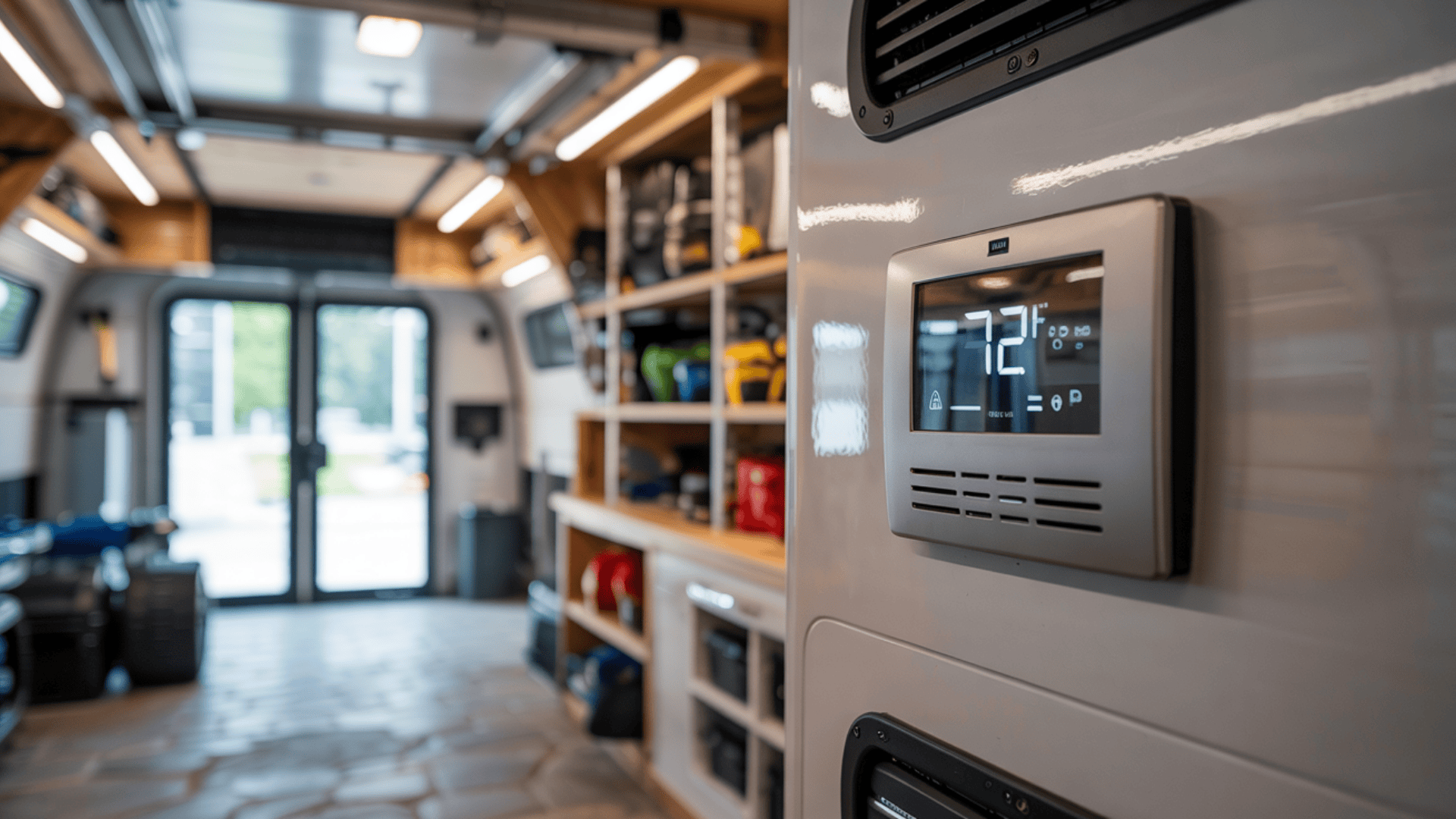
The multi-purpose nature of the garage space creates inherent challenges for climate control and comfort. Many toy haulers, particularly entry and mid-level models, feature reduced insulation in the garage area compared to the main living quarters.
During extreme weather conditions, these differences become particularly problematic if the garage is being utilized as additional living space.
Condensation issues can develop where temperature boundaries meet, potentially leading to moisture-related concerns.
While premium toy haulers often address this with equivalent insulation throughout, budget-conscious buyers should carefully evaluate the garage area’s climate control capabilities.
4. Fumes & Vapors
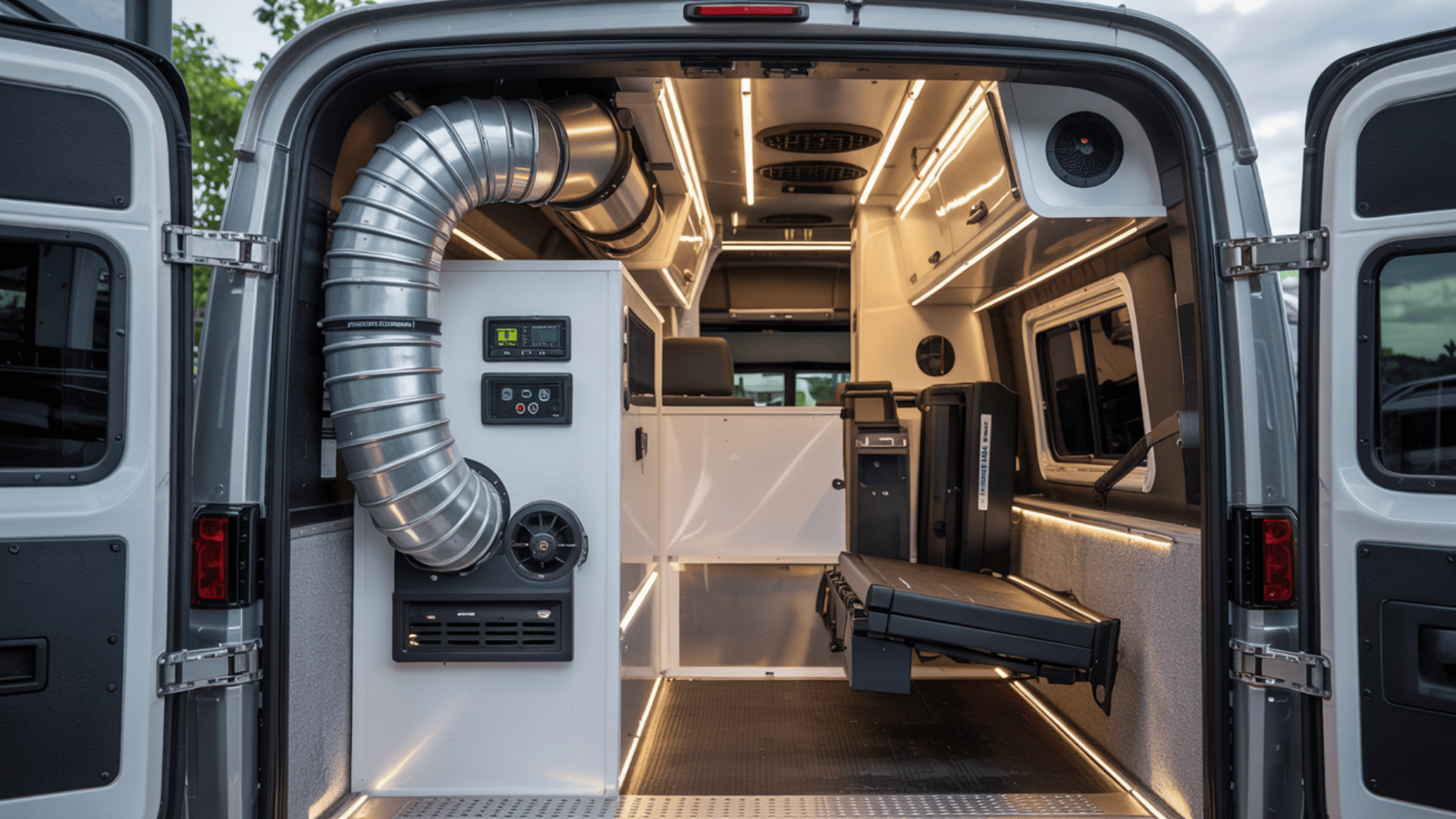
The transportation of gasoline-powered recreational vehicles introduces air quality considerations unique to toy haulers.
During storage and transit, small amounts of fuel vapor can escape from equipment, creating potential odor and air quality issues within the confined space.
Manufacturers address this through various ventilation systems, but their effectiveness varies significantly between models.
Units with dedicated fueling stations must incorporate specialized vapor management systems to maintain interior air quality.
The proximity of sleeping quarters to areas where gasoline engines have been operated requires careful management to ensure healthy interior air quality.
The Real Cost of Owning a Toy Hauler
Let’s talk money. Toy haulers deliver incredible versatility, but that functionality comes with a price tag. Here’s what you can expect to pay compared to standard RVs:
1. Initial Purchase
Toy haulers cost more upfront due to their added features:
- Entry-Level Trailer (18-24 ft): Standard: $18,000-$35,000; Toy Hauler: $25,000-$45,000 (+$7,000-$10,000).
- Mid-Range Fifth Wheel (28-34 ft): Standard: $45,000-$75,000; Toy Hauler: $55,000-$95,000 (+$10,000-$20,000).
- Luxury Class A: Standard: $120,000-$200,000; Toy Hauler: $150,000-$250,000 (+$30,000-$50,000).
2. Annual Insurance
Insurance is higher for toy haulers: A standard RV costs $800-$1,200/year, while toy haulers range from $1,000-$1,800 ($200- $600).
3. Specialized Maintenance
Toy haulers have unique upkeep costs:
- Ramp Door Service:$250-$400/year.
- Tie-Down Repairs:$150-$300/year.
- Garage Seals:$100-$175/year (based on $200-$350 every 2 years).
4. Fuel Economy
Toy haulers burn more fuel: an extra $500-$1,200/year for 10,000 miles due to 25-40% higher consumption.
In short, toy haulers offer versatility but at a higher cost across purchase, insurance, maintenance, and fuel compared to standard RVs.
Long-Term Value Considerations
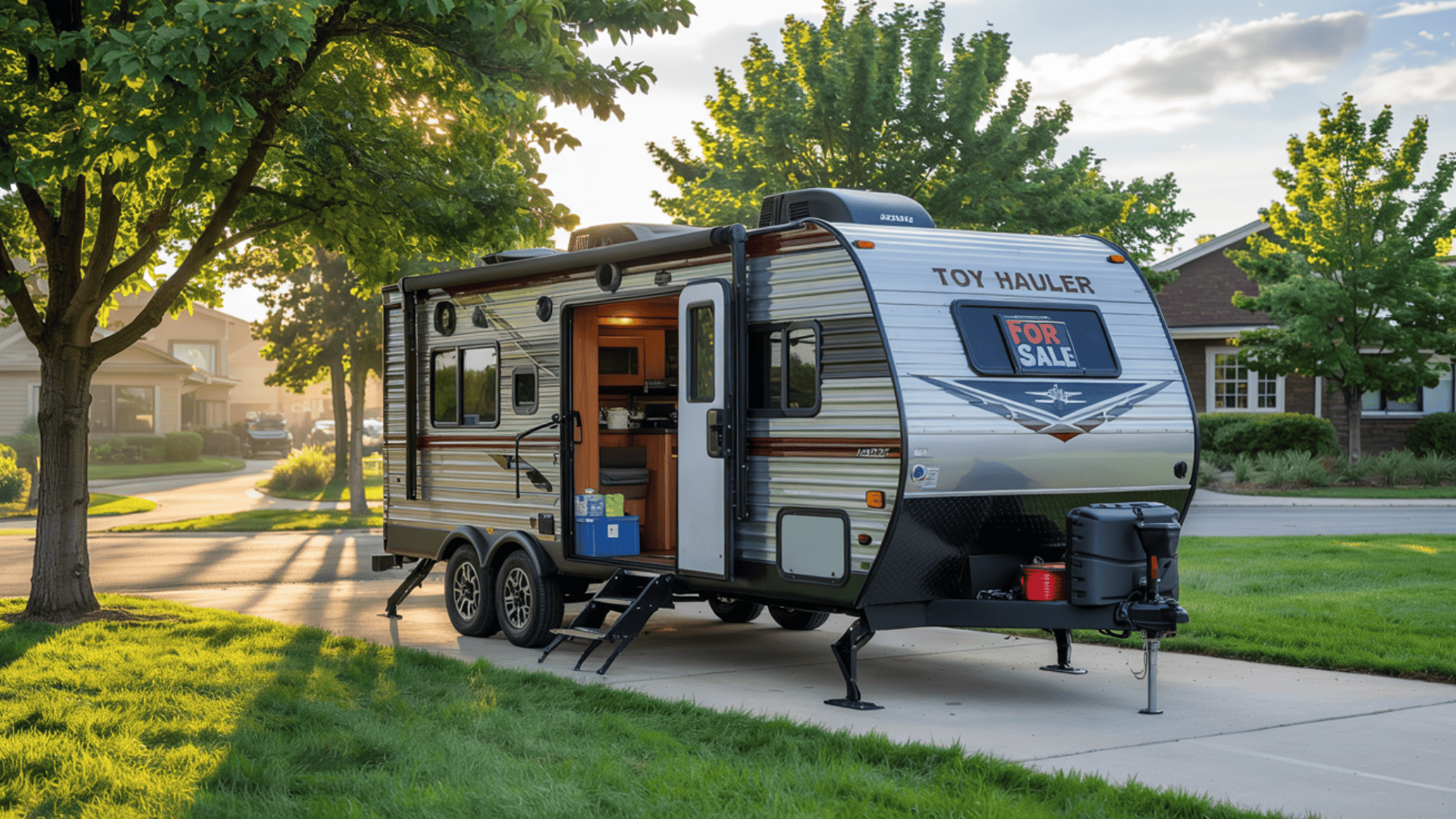
- Resale Value: Toy haulers typically retain 5-10% more value over 5 years than standard RVs if properly maintained
- Insurance Deductibles: Often $500-$1,000 higher for toy haulers due to more complex systems
- Extended Warranty Costs: $2,000-$4,500 for toy haulers vs. $1,500-$3,500 for standard RVs of comparable size
The bottom line: Expect to invest approximately 15-30% more upfront and 20-25% more annually to own a toy hauler compared to a standard RV.
For many outdoor enthusiasts, the additional functionality justifies these costs—but budget-conscious buyers should weigh these financial implications carefully against their specific needs.
Who Should Consider a Toy Hauler?
Find your match! Check which of these describes you:
1. The Adventure Seeker
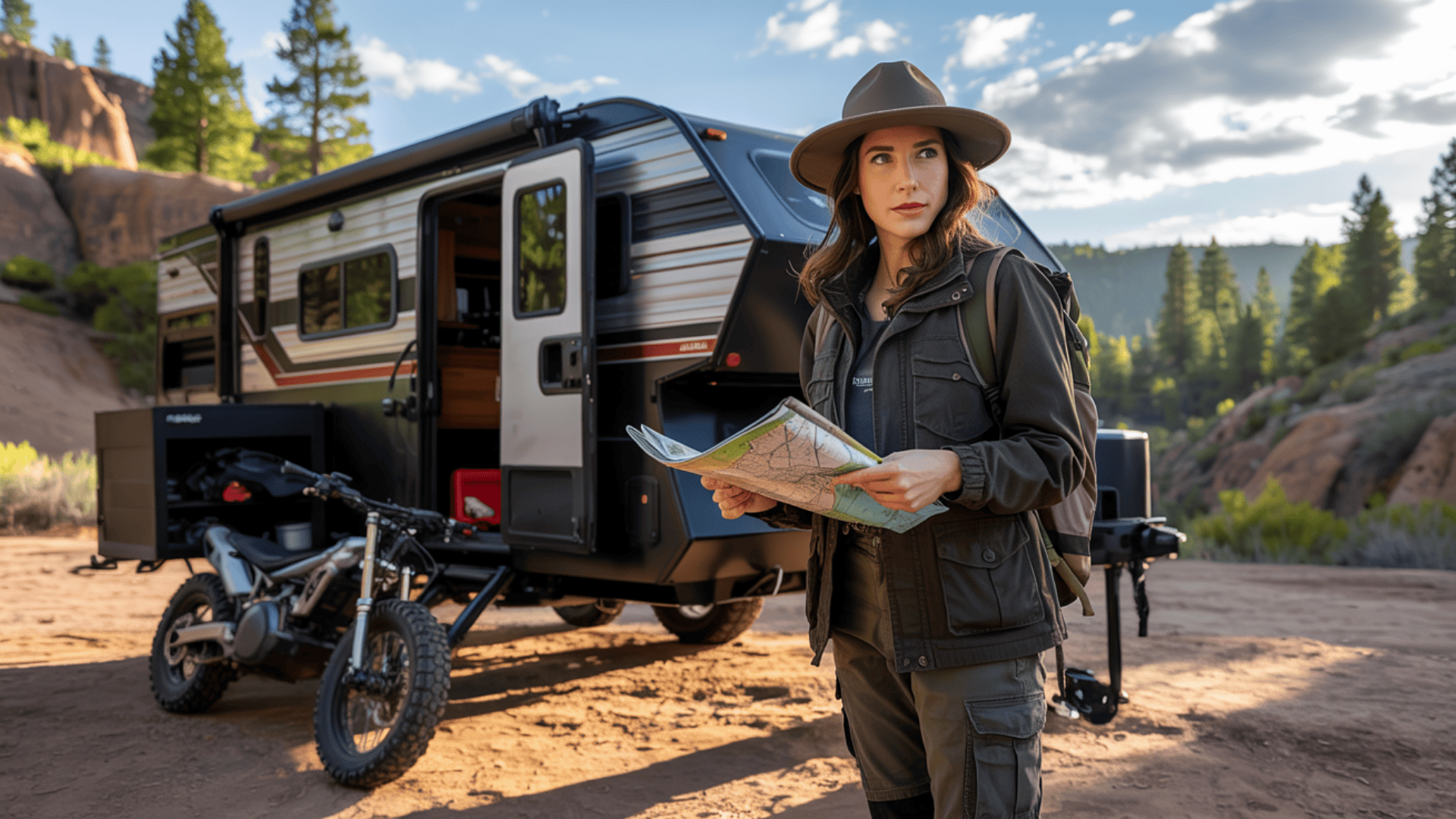
- Do you own ATVs, dirt bikes, or jet skis?
- Want to wake up right next to your riding trails?
- Need secure systems to transport heavy equipment?
Toy haulers are literally designed for you! Purpose-built loading ramps, tie-downs, and weight capacities make transporting your motorized toys a breeze.
2. The Space-Hungry Family
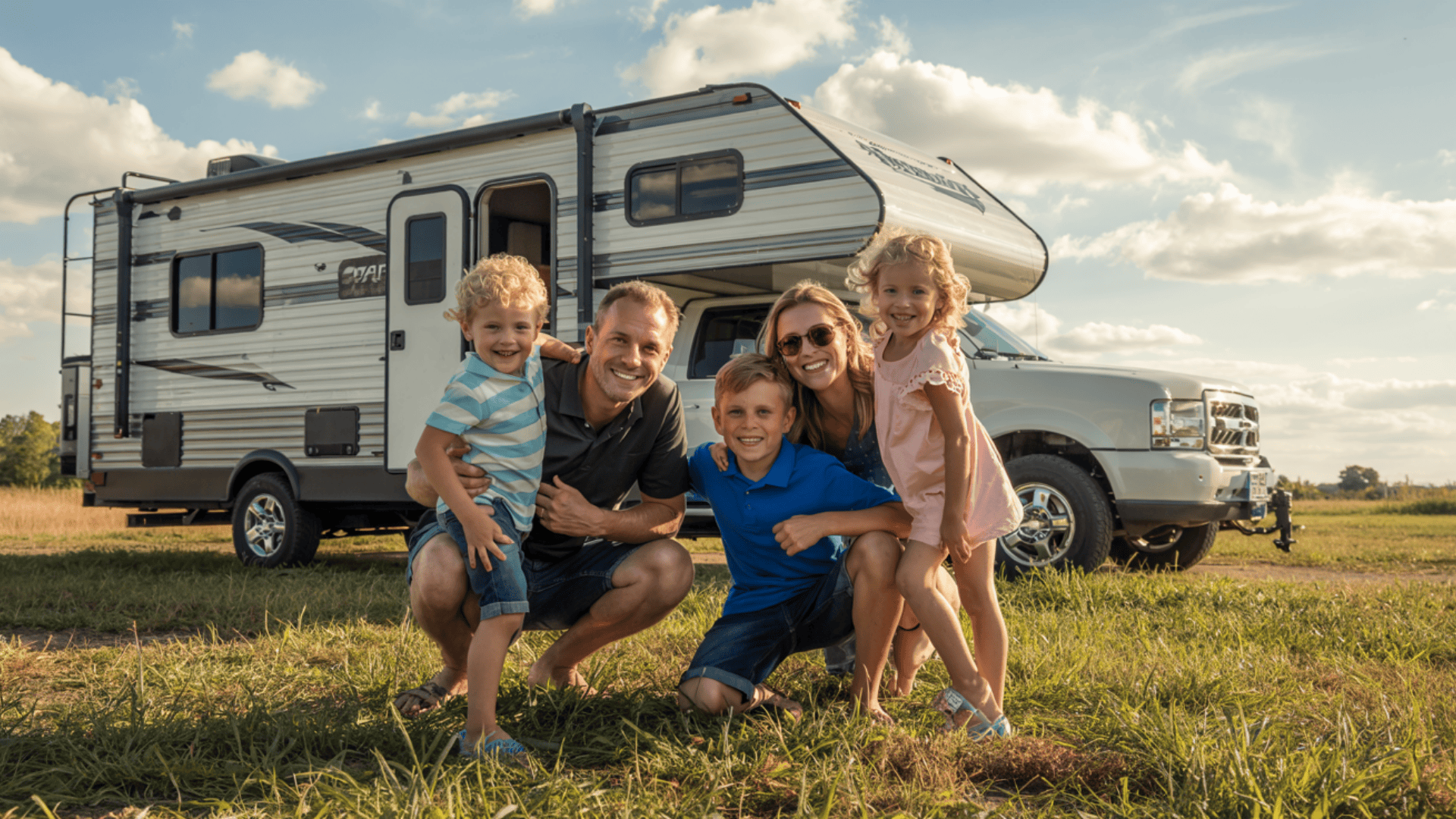
- Traveling with kids or multiple generations?
- Need extra sleeping areas that don’t feel cramped?
- Want a play space that converts to dining when needed?
The garage area transforms into whatever you need—extra bedrooms, play zones, or dining space—plus the reinforced construction handles active family life better than standard RVs.
3. The Digital Nomad
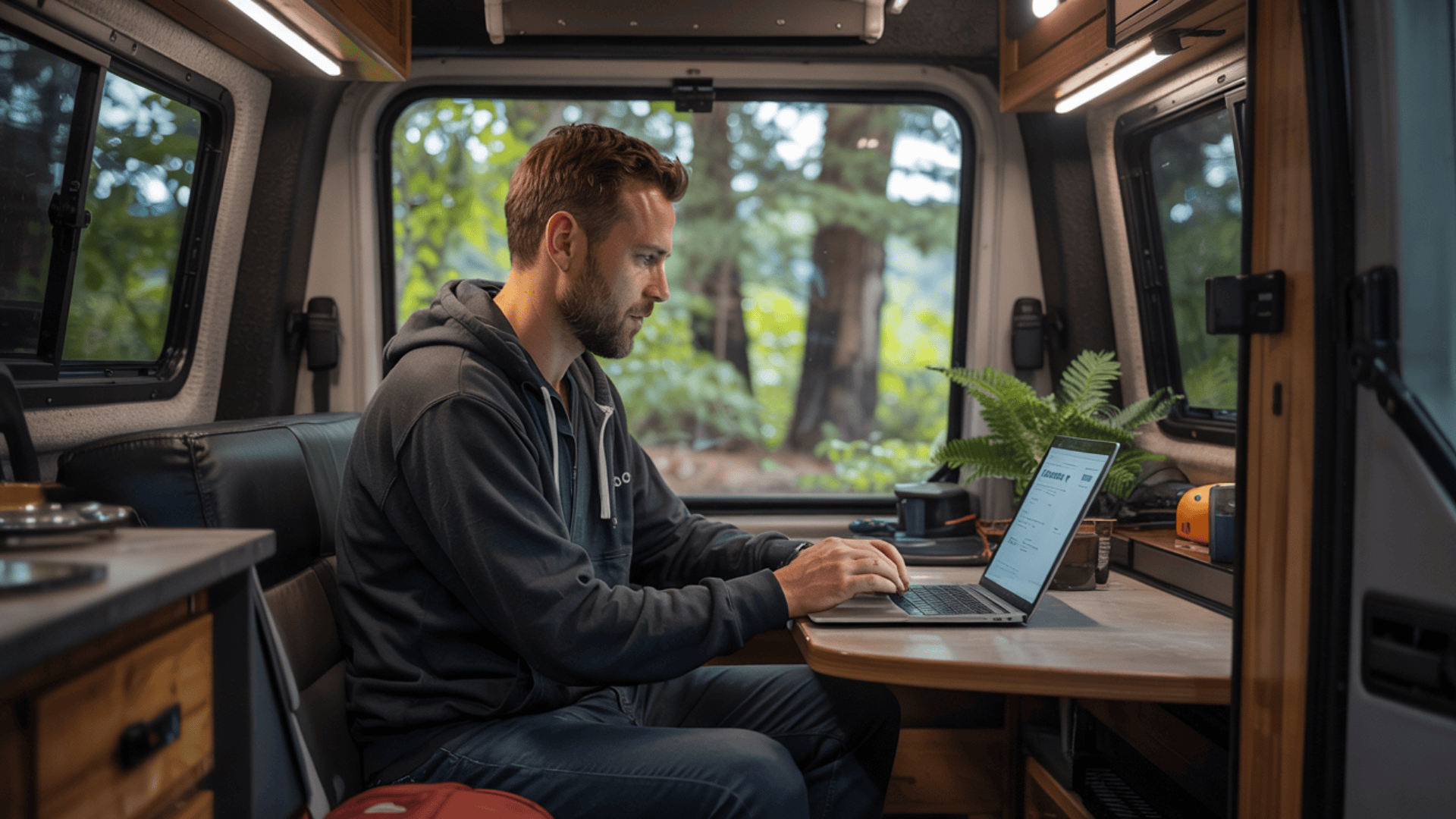
- Working remotely while traveling?
- Need a dedicated office space separate from living areas?
- Require stable setups for computer equipment?
Convert the garage into your dream mobile office with space for a full desk setup and the separation needed for work-life balance!
4. The Event Enthusiast

- Attend festivals, races, or sporting events?
- Need space for event gear and equipment?
- Love to entertain at your campsite?
Turn that ramp into a party deck, store all your event supplies in the garage, and enjoy having your own on-site accommodations.
5. The Gear Junkie
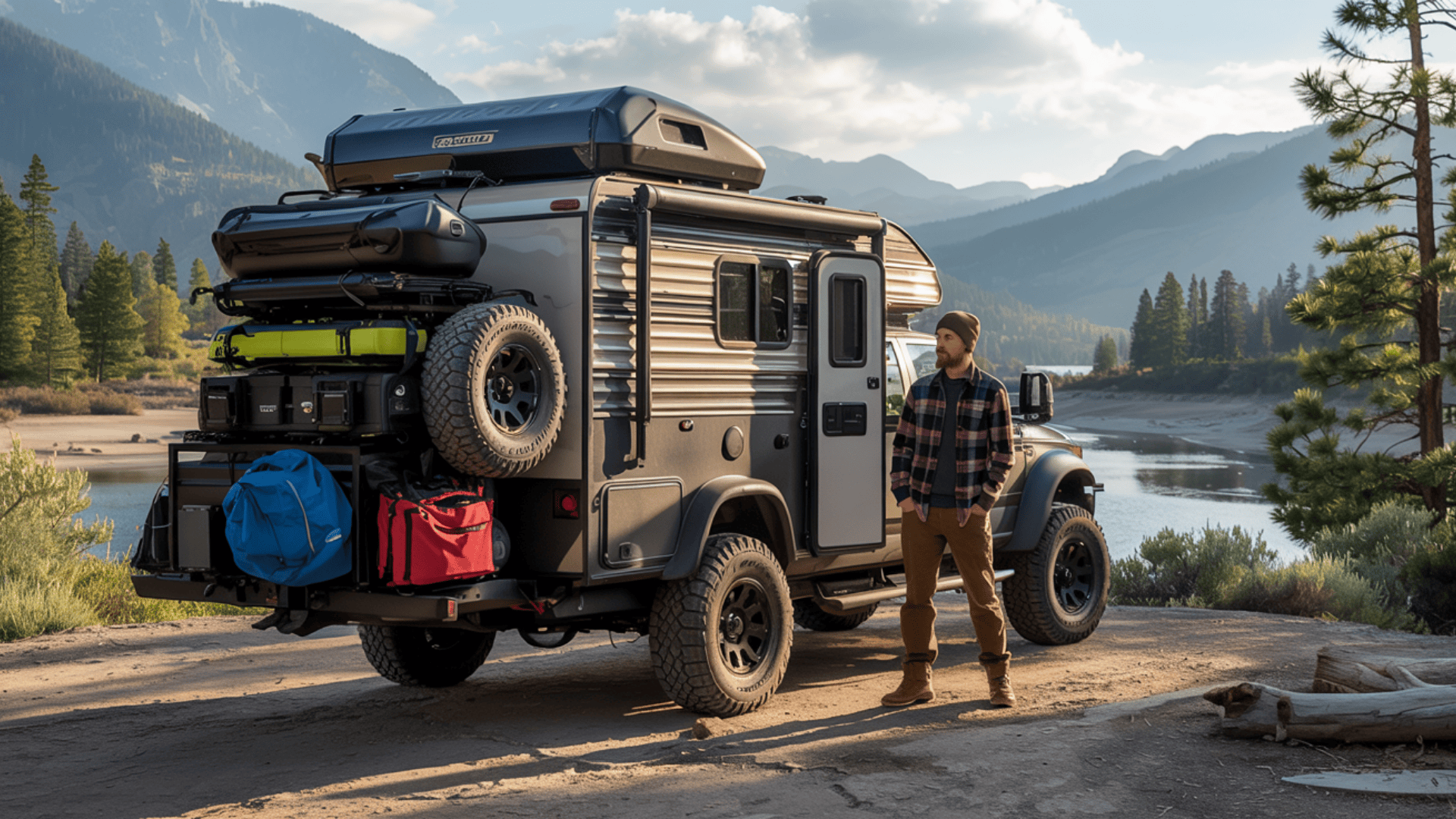
- Have a collection of non-motorized adventure gear?
- Need organized storage for bikes, kayaks, or climbing equipment?
- Want easy loading/unloading with minimal hassle?
Even without motorized toys, the garage space, reinforced floors, and wide loading ramp make toy haulers perfect for gear-intensive travelers.
Toy Hauler vs Regular Camper
| Feature Category | Toy Hauler | Regular Camper |
|---|---|---|
| Equipment Storage | Dedicated garage space (40-160 sq ft); reinforced flooring; integrated tie-downs; loading ramp | Limited to exterior racks or small interior compartments; not designed for heavy equipment |
| Interior Comfort | Typically more utilitarian finishes; convertible spaces; dual-purpose areas | More residential appointments; dedicated single-purpose spaces; larger permanent living areas |
| Weight & Towing | Heavier construction; requires more substantial towing vehicles; reduced fuel economy | Lighter weight; compatible with a broader range of towing vehicles; improved fuel efficiency |
| Price Point | 15-30% premium over comparable regular campers; higher operational costs | More affordable initial purchase; lower associated maintenance costs |
| Flexibility | Highly adaptable spaces; multiple configuration options; indoor-outdoor living | Fixed interior layouts; limited adaptability; traditional camping experience |
| Target User | Adventure enthusiasts; large groups needing extra space; event attendees with equipment | Traditional campers, comfort-focused travelers, those prioritizing living amenities |
Wrapping It Up!
Ready to blur the lines between “roughing it” and “living in comfort” on your next adventure? Toy haulers offer that sweet spot where convenience meets capability, where you can rip through trails all day and kick back in comfort all night.
They’re not just RVs with a garage slapped on—they’re purpose-built adventure machines that adapt to your lifestyle.
So, if you’re hauling dirt bikes, running a mobile business, or need extra space for your gear-obsessed family, there’s a toy hauler configuration with your name on it.
The open road is calling, and this time, you can bring all your favorite toys along for the ride!

